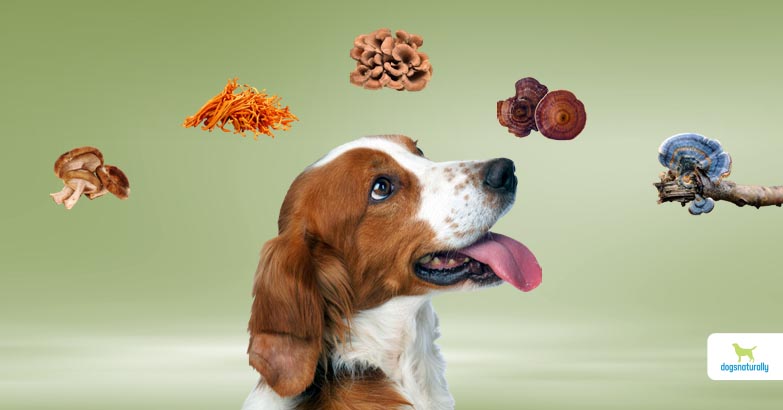No other food is more beneficial to your dog than mushrooms. And in some cases, no other food is as toxic. So the answer to “can dogs eat mushrooms?” is yes, they can (and they should) … but not all of them.
So here’s a complete list of mushrooms that are toxic to dogs … and we’ll also give you a list of the top beneficial mushrooms that have medicinal, immune-modulating properties.
How Can You Tell If A Mushroom Is Poisonous?
There are over 14,000 mushroom species, many of which are edible. Other mushrooms can be toxic or hallucinogenic. So, with so many types of mushrooms, how do you know if a mushroom is poisonous before it harms your dog?
First of all, it’s a good idea to carry a mushroom identifier app. This way, if Fido decides to forage on fungi, you can quickly identify the species. Poisonous mushrooms tend to share similar characteristics, so even if you can’t identify the right species, you’ll still have a good idea if the mushroom is edible or not.
If you don’t recognize the mushroom, examine it for these common signs of poisonous mushrooms:
- White gills (the underside of the mushroom cap)
- Red in color
- A ring around the stem
- The presence of a volva (bulging at the base of the stem)
If the mushroom has any of these attributes, assume it’s poisonous and take your dog to the vet.
Which Mushrooms Are Poisonous?
Mushrooms that your dog can’t eat include …
- Amanita phalloides (Death Cap)
- Galerina marginata (Autumn Galerina)
- Amanita gemmata (Jeweled Deathcap)
- Amanita muscaria (Fly Agaric)
- Gyromitra species (False Morel)
- Helvella Lacunosa (Elf’s Saddle)
- Clitocybe dealbata (Ivory Funnel)
- Inocybe species
It can be difficult to identify toxic mushrooms … even expert foragers have trouble with certain species. So if your dog likes snacking on walks, be careful he’s not helping himself to mushrooms!
To be safe, assume all mushrooms in the wild or on your grass are toxic unless you’re an expert forager. Death is a real possibility for dogs who eat the wrong mushrooms.
What Happens If Your Dog Eats A Poisonous Mushroom?
The symptoms of mushroom poisoning will depend on the species of mushroom and the amount your dog eats. Your dog might suffer mild digestive upset … or he might become very sick and your vet might not be able to save him. But the faster you get him to the vet, the better the outcome. So don’t delay … it can take 12 hours for your dog to show symptoms of mushroom poisoning and by then, it may be too late.
The most common signs of mushroom toxicity include:
- Vomiting
- Diarrhea
- Drooling
- Teary
- Weakness
- Ataxia (walking like he’s drunk)
- Lethargy
- Jaundice (yellowing skin or eyes)
- Abdominal pain
If your dog ate a mushroom, and especially if he has any of these signs, take your dog and the mushroom to the vet (even a picture of the mushroom will do). Your vet will run blood and urine tests to make sure the toxins from the mushrooms do as little harm to your dog’s organs as possible. Your vet might induce vomiting or give your dog activated charcoal to stop the toxin from leaving your dog’s digestive tract and traveling to his organs.
The organs most likely to be affected by mushroom toxicity include the …
Digestive Tract
Your dog might develop mild digestive symptoms like vomiting and diarrhea.
Nervous System
If the mushroom is toxic to the nervous system, you may see signs of hallucinating. This might include weakness, trembling, stumbling and lack of coordination, agitation … and even seizures.
Liver And Kidneys
Some mushrooms will affect your dog’s liver. Some species can even cause liver failure. These symptoms take longer to appear, but you’ll see weakness, lethargy and jaundice. Your dog must be treated quickly to avoid irreversible liver damage. The toxins in some mushrooms can also damage the kidneys. It can take hours or days before you notice symptoms and by then, the damage may also be irreversible.
An emergency visit to the vet sounds frightening and expensive … but left untreated, mushroom poisoning can lead to organ failure, seizures and death. Even one mushroom of the wrong species can kill a medium sized dog, so it’s better to be safe than sorry.
Mushrooms That Dogs Can Eat
While some species of mushrooms are toxic to dogs, many are just fine for dogs to eat. In fact, mushrooms are one of the most potent immune-modulating foods you can give your dog. Apart from these medicinal varieties, some mushrooms are also quite nutritious. So let’s look at the nutritional and health-boosting mushrooms you can give your dog.
Store Bought Mushrooms For Dogs
The mushrooms you buy in the store are perfectly safe for your dog as well as you. And they’re nutritious! Mushrooms are rich in:
- Minerals (including selenium, zinc and potassium)
- Vitamins (B complex, folic acid and pro-vitamin D)
- Healthy fats, proteins and digestive enzymes
- Terpenes, alkaloids, polyphenols, polysaccharides
- Antioxidants that prevent free radical damage
- Prebiotics to support gut health
But it’s important to note that dogs shouldn’t eat their mushrooms raw. Mushrooms contain a tough, chitinous wall that holds the nutrients. Cooking breaks this wall down, making the mushrooms nutrients available for your dog. Cooking also inactivates monomethyl hydrazine … a substance that can be toxic in raw mushrooms.
Store bought mushrooms like button and portobello are nutritious for your dog. But many other varieties of mushrooms contain special polysaccharides and triterpenoids that can modulate your dog’s immune system. They’ve been extensively researched for the role they can play in preventing and treating allergies, cancer and autoimmune diseases. These species of mushrooms are called Medicinal Mushrooms.
Medicinal Mushrooms For Dogs
Mushrooms have been used to treat disease for thousands of years. But recently, scientists have identified a key polysaccharide in mushrooms that shows a lot of promise in treating cancer and other immune diseases. This is called beta 1,3 D-glucan. Beta-glucans from the turkey tail mushroom have even been made into anti-cancer treatments in China and Japan.
Beta-glucans are protected by the mushroom’s thick chitin wall. So for your dog to get their immune benefits, they need to be double extracted. This means the mushrooms are soaked in alcohol and then hot water. Very little of the alcohol will remain in the resulting mushroom. This process makes the important beta-glucans and other active medicinal ingredients available to your dog. So make sure you learn how to double extract your own mushrooms, or buy a pre-made mushroom powder that’s already been double extracted.
There are a few medicinal mushrooms for dogs you will want to consider. These are the mushrooms with the most exciting research behind them:
1. Turkey Tail (Trametes versicolor)
Turkey tail mushrooms feature colorful rings that look like a turkey’s tail. This is an important cancer-fighting mushroom with unique beta-glucans called polysaccharide-K (PSK) and polysaccharopeptide (PSP). These compounds are the active ingredients in Krestin, an anti-cancer drug in Japan.
Turkey tail mushroom is extensively researched for its anti-cancer and immune modulating benefits:
- A 2011 study reported turkey tail reduced tumor size in breast cancer patients.
- A 2012 study showed increased survival times for patients with breast, gastric and colorectal cancer.
- A 2017 study found turkey tail was almost as effective as chemo (and without the side effects).
- A 2012 study showed turkey tail mushrooms tripled the life expectancy of dogs with hemangiosarcoma, an aggressive vascular cancer.
The turkey tail mushroom is also a nutritional powerhouse. It’s rich in prebiotics and can directly improve gut health. It’s also rich in phytonutrients and antioxidants, which can help clean up the free radical damage that leads to aging and declining organ function.
Top Uses For Turkey Tail
- Prevent cancer and reduce effects of cancer treatment
- Improve liver function
- Prevent and fight chronic disease
- Reduce inflammation in the urinary tract and digestive system
- Improve gut health
- Treat pulmonary disorders
2. Lion’s Mane (Hericium erinaceus)
Lion’s mane mushrooms are aptly named because of their similarity to the mane of a lion. They taste like lobster and have many benefits … especially for senior dogs. Lion’s mane mushrooms are rich in …
Antioxidants
Lion’s mane mushrooms contain antioxidants that fight free radicals. This prevents several diseases … including cancer, heart disease and premature aging.
Dilinoleoyl-phosphatidylethanolamine
This phospholipid protects against cell death of neurons caused by oxidative stress. Oxidative stress is when there is an excess of free radicals.
Beta-glucans
The polysaccharides found in lion’s mane can boost the immune system. They do this through increased cell-mediated and humoral immunity. Like other mushrooms, they also have anti-cancer properties.
Erinacines and Hericenones
Erinacines and hericenones are extracted from lion’s mane. They pass through the blood-brain barrier to stimulate nerve growth factor (NFG). NFG helps keep brain neurons alive. Research links low levels of NFG to Alzheimer’s, dementia and similar diseases. Hericenones can also activate cancer cell death and prevent metastasis. They also slow and reverse lung, stomach, liver and colon cancer as well as leukemia.
Top Uses For Lion’s Mane
- Improve brain function
- Help manage degenerative myelopathy
- Prevent and fight cancer
- Boost the immune system
- Manage ulcers, inflammatory bowel disease, gastritis and other digestive issues
- Improve heart health
- Manage weight
- Prevent blood clotting
- Fight bacterial infections like MRSA (Methicillin-Resistant Staphylococcus aureus) and H pylori
3. Cordyceps (Cordyceps militaris)
In the wild, these mushrooms grow on caterpillars. But growers can also cultivate them. Cultivated cordyceps are cheaper … but also less potent. Cordyceps offer many benefits …
Beta-glucans
Cordyceps are full of polysaccharides. That makes them a good choice to support the immune system. They also stimulate the release of cell signalling molecules called cytokines. This helps fight tumor cells.
Cordycepin
Cordycepin is antitumoral, antibacterial, antiviral and incesticidal. It helps fight tumors, bacteria and parasites.
Ergosterol
Like turkey tail mushrooms, cordyceps contain ergosterol. Ergosterol is a steroid alcohol that is an anticancer and antioxidant.
Top Uses For Cordyceps
- Slow aging
- Prevent and fight cancer including lung cancer
- Help manage diabetes
- Reduce skin inflammation
- Boost performance
- Treat leaky gut
- Help with chronic liver disorders
- Treat kidney failure
- Manage cardiac arrhythmias
- Help with asthma
- Support geriatric disorders
- Treat hypercholesterolemia
4. Maitake (Grifola frondosa)
Maitake is also known as the dancing mushroom … supposedly because people would dance with excitement when they found this powerful healing mushroom in the wild.
Maitake is one of the most potent mushrooms to slow cancer growth. Its anticancer properties come from a substance called D-fraction … which is a combination of beta-glucans and protein. D-fraction has anti-cancer properties that can stop tumor growth and increase cancer fighting cells. It’s also effective in fighting lymphoma, mammary and connective tissue cancers.
Top Uses For Maitake
- Reduce glucose levels to help manage diabetes
- Remedy kennel cough and canine flu
- Prevent cancer and provide support during cancer treatment
- Support the liver
- Replace chemotherapy for breast cancer
5. Chaga (Inonotus obliquus)
Chaga is also known as the ugly mushroom. It’s found on birch trees in cold climates.
Healers have used chaga since the 16th century. Here’s why your dog should eat chaga mushrooms …
Beta-glucans
These polysaccharides in chaga can boost heart, intestinal and liver health. They improve energy levels and provide anti-cancer properties.
Vitamins and Minerals
Chaga mushrooms are rich in vitamins and minerals that support your dog’s health. They boost the immune system and help keep organs healthy. So they help your dog fight off viruses, infection, and toxins.
Polyphenols
Polyphenols are plant based compounds that are packed with antioxidants. That means they can scavenge free radicals that lead to cancer and premature aging.
Triterpenoids
Triterpenoids are in many edible plants and have anticancer properties. They can halt cell growth in leukemia, Walker 256 carcinoma and breast cancer.
Research on chaga mushroom extract found it can be effective against melanoma, liver, and colon cancers.
Top Uses For Chaga
- Fight and prevent cancer
- Scavenge free radicals to prevent aging
- Reduce inflammation
- Fight viruses
- Boost the immune system to manage allergies and autoimmune diseases like arthritis
- Reduce toxicity of traditional cancer treatments
- Improve gut health
- Regulate blood sugar levels
- Decrease cholesterol
6. Phellinus
Phellinus is a mushroom with many medicinal properties. It’s anti-inflammatory, antibacterial, anticancer … and it boosts the immune system.
Phellinus mushrooms are especially effective against methicillin-resistant Staphylococcus aureus (MRSA) bacteria.
Here are other phellinus benefits …
Beta-glucans
The beta-glucans in phellinus increase the immune activity of macrophages and B-cells. And they can help destroy cancer cells.
Proteoglycans (PGs)
PGs are protein molecules found in the spaces between your dog’s cells. They help protect cells in your dog’s body.
Alcohol tincture of phellinus contains PGs. It’s used as an anti-inflammatory to support joint disease. One study showed it could even replace non-steroidal anti-inflammatories (NSAIDs).
Top Uses For Phellinus
- Prevent and fight cancer
- Replace antibiotics
- Reduce inflammation
- Support joint health
7. Reishi (Ganoderma lucidum)
Reishi mushrooms are known as the mushroom of immortality. Once you read on, you’ll understand why …
Triterpenoids
Like chaga, reishi has triterpenoids that can help stop the growth of cancerous cells. This has a lot to do with their cytotoxic and chemopreventive activity.
Ganoderic Acid
This triterpene slows the release of histamines. This helps with allergies as it helps stop the itch.
Polysaccharides
Reishi contains polysaccharides that help boost the immune system and prevent cancer.
Antioxidants
Reishi mushrooms provide antioxidants that support the immune system. They also help detoxify and protect the liver. Research shows antioxidants in Reishi can also speed up wound healing in diabetics.
Along with its anti-inflammatory benefits, these Reishi properties have been shown to extend life. (That’s why it’s called the mushroom of immortality.)
Top Uses For Reishi
- Inhibit antihistamine release to manage allergy symptoms
- Slow aging
- Regulate immune response
- Fight and prevent cancer
- Support organs, especially the heart and liver
- Manage kidney issues associated with diabetes
- Regulate glucose levels
- Improve endurance
- Manage arthritis
- Treat upper respiratory infections
- Relieve pain
8. Shiitake (Lentinula edodes)
You may be familiar with shiitake. It’s a popular eating mushroom. But its many health benefits may surprise you.
Lentinan
This polysaccharide supports the heart and immune system. It’s also effective in the fight against cancer, especially gastric cancer.
Enzymes
Shiitake mushrooms contain up to 30 different enzymes that help manage digestive issues. One of these enzymes in amylase, which helps break down carbohydrates and starches. So shiitake are useful for dogs with high starch diets, like kibble.
Amino Acids
Shiitake also contains up to 10 amino acids. Amino acids are the building blocks of protein. They also synthesize hormones and neurotransmitters … which can help with mood and performance.
Minerals
Shiitake mushrooms are rich in several minerals your dog needs. They’re especially high in calcium, zinc, magnesium, iron and selenium.
They can also lower blood serum cholesterol. In one study, rats had a 25% reduction in total cholesterol after they ate shiitake for a week. Researchers have yet to identify the component that caused this effect.
Top Uses Of Shiitake
- Support immune system
- Prevent cancer and reduce side effects of chemo
- Help with digestive health
- Improve heart health
- Lower cholesterol
- Soothe bronchial inflammation
- Regulate urinary incontinence
- Help relieve allergy symptoms
How To Feed Mushrooms To Your Dog
You can buy fresh or dried mushrooms for your dog, but mushroom powders are the most convenient choice.
How To Choose A Powdered Supplement
Mushroom supplements come in powder and capsule form. But there’s one important fact you need to know before you buy a mushroom supplement.
Always read the label to check the product is made from whole mushrooms … not mycelium.
The main medicinal component in mushrooms is the beta-glucans. But most mushroom supplements are made from mycelium, the root of the mushroom. And mycelium has much less beta-glucan than the mushroom body.
Mycelium are usually grown on grains or rice … not in their natural environment. That makes mycelium much higher in starch than the whole mushroom. It also means their beta-glucan content comes from the grain. Grain-derived beta-glucans don’t have the anti-cancer and immune-modulating properties.
So always buy a supplement that uses whole mushrooms.
Dosing Mushroom Powder
If the product is for dogs, follow the directions on the package. If it’s packaged for humans, assume the dosage is for a 150 lb person and adjust for your dog’s weight.
It’s always best to start with a lower dose and work up. That will help avoid any digestive upset.
You can also buy many medicinal mushrooms in dried form. Making a broth is an easy way to extract their benefits for your dog.
Mushroom Broth
Combine dried mushrooms in a pan with a lid. Add enough water to cover the mushrooms. Bring to a boil and simmer until the mushrooms are soft. Keep an eye on them to make sure the liquid doesn’t dry out, adding more water as necessary.
You can strain and save the broth, or leave the mushrooms in the broth and serve as a stew! Cool, and store in the fridge.
Give your dog ½ ml per 5 lbs of body weight.
Don’t be afraid to share edible mushrooms with your dog. When you take the time to source the right mushrooms, they can be an healing and nourishing addition to your dog’s diet. Mushrooms fight cancer, boost the immune system, and help manage allergies … among other benefits.
So let your dog try some mushrooms and see how much they can do for his health. Just don’t let him eat wild mushrooms in your yard or on the trail.
References
Wong LYE, et al. Efficacy of Yun Zhi (Coriolus versicolor) on survival in cancer patients: systematic review and meta-analysis. Recent Pat Inflamm Allergy Drug Discov. 2012 Jan;6(1):78-87.
Annoor A, et al. Purification, characterization, and antitumor activity of a novel glucan from the fruiting bodies of Coriolus Versicolor. PLoS One. 2017 Feb 8;12(2):e0171270.
Brown DA, et al. Single agent polysaccharopeptide delays metastases and improves survival in naturally occurring hemangiosarcoma. Evid Based Complement Alternat Med. 2012 Sept 5;384301.
Pallar K, et al. Effects of polysaccharopeptide from Trametes versicolor and amoxicillin on the gut microbiome of healthy volunteers: a randomized clinical trial. Gut Microbes. 2014 Jul 1;5(4):458-67.
Chang Y, et al. Preclinical and Clinical Studies of Coriolus versicolor Polysaccharopeptide as an Immunotherapeutic in China. April 21, 2017.
Mei J, et al. Anti-inflammatory activities of the chemical constituents isolated from Trametes versicolor. Nat Prod Res. 2019 Aug;33(16):2422-2425.
Mohammad AR, et al. Inhibitory effect on in vitro LDL oxidation and HMG Co-A reductase activity of the liquid-liquid partitioned fractions of Hericium erinaceus (Bull.) Persoon (lion’s mane mushroom). Biomed Res Int. 2014;2014:828149.
Kawagishi H, et al. Compounds for dementia from Hericium erinaceum. Drugs of the Future. 2008;33(2):149-155.
Xiaotong S, et al. Immunomodulatory effects of Hericium erinaceus derived polysaccharides are mediated by intestinal immunology. Food Funct. 2017 Mar 22;8(3):1020-1027.
Sung PK, et al. Hericium erinaceus (Lion’s Mane) mushroom extracts inhibit metastasis of cancer cells to the lung in CT-26 colon cancer-tansplanted mice. J Agric Food Chem. 2013 May 22;61(20):4898-904.
Kolotushkina EV, et al. The influence of hericium erinaceus extract on myelination process in vitro. Fiziol Zh. 2003;49(1):38-45.
Wang M, et al. Anti-gastric ulcer activity of polysaccharide fraction Isolated from mycelium culture of lion’s mane medicinal mushroom, hericium erinaceus (Higher Basidiomycetes). Int J Med Mushrooms. 2015;17(11):1055-60.
Qin M, et al. Anti-inflammatory effects of ethanol extract of lion’s mane medicinal mushroom, hericium erinaceus (Agaricomycetes), in mice with ulcerative colitis. Int J Med Mushrooms. 2016;18(3):227-34.
Kazuyuki H, et al. Yamabushitake mushroom (Hericium erinaceus) improved lipid metabolism in mice fed a high-fat diet. Biosci Biotechnol Biochem. 2010;74(7):1447-51.
Hirokazu K. Anti-MRSA compounds from hericium erinaceus (bull.:fr.) pers. International Journal of Medicinal Mushrooms. 2005;7(3).
Shang X, et al. In vitro anti-helicobacter pylori effects of medicinal mushroom extracts, with special emphasis on the lion’s mane mushroom, hericium erinaceus (higher basidiomycetes). Int J Med Mushrooms. 2013;15(2):165-74.
Barbieri A, et al. Anticancer and anti-inflammatory properties of eanoderma lucidum extract effects on melanoma and triple-negative breast cancer treatment. Nutrients. 2017 Mar; 9(3): 210.
Deng-Bo J, et al. Antiaging effect of Cordyceps sinensis extract. Phytother Res. 2009 Jan;23(1):116-22.
Dong Y, et al. Studies on the antidiabetic activities of cordyceps militaris extract in diet-streptozotocin-induced diabetic sprague-dawley rats. BioMed Research International. 2014.
So-Young W, et al. Anti-inflammatory and related pharmacological activities of cultured mycelia and fruiting bodies of cordyceps militaris. J Ethnopharmacol. 2005 Jan 15;96(3):555-61.
Yuki M, et al. Oral administration of soluble β-glucans extracted from Grifola frondosa induces systemic antitumor immune response and decreases immunosuppression in tumor-bearing mice. Int J Cancer. 2013 Jul;133(1):108-19.
Ya-Hui C, et al. Submerged-culture mycelia and broth of the maitake medicinal mushroom grifola frondosa (Higher basidiomycetes) alleviate type 2 diabetes-induced alterations in immunocytic function. Int J Med Mushrooms. 2015;17(6):541-56.
Braico DA, et al. Comparative effect of maitake pro4x with chemotherapy breast cancer treatment. Braico et al., Biol Med (Aligarh.) 2017,9:3.
Yong C, et al. Antioxidant effect of inonotus obliquus. J Ethnopharmacol. 2005 Jan 4;96(1-2):79-85.
Nomura M, et al. Inotodiol, a lanostane triterpenoid, from Inonotus obliquus inhibits cell proliferation through caspase-3-dependent apoptosis. Biology, Medicine. Anticancer research. 2008.
Myung-Ja Y, et al. Potential anticancer properties of the water extract of Inonotus [corrected] obliquus by induction of apoptosis in melanoma B16-F10 cells. J Ethnopharmacol. 2009 Jan 21;121(2):221-8.












